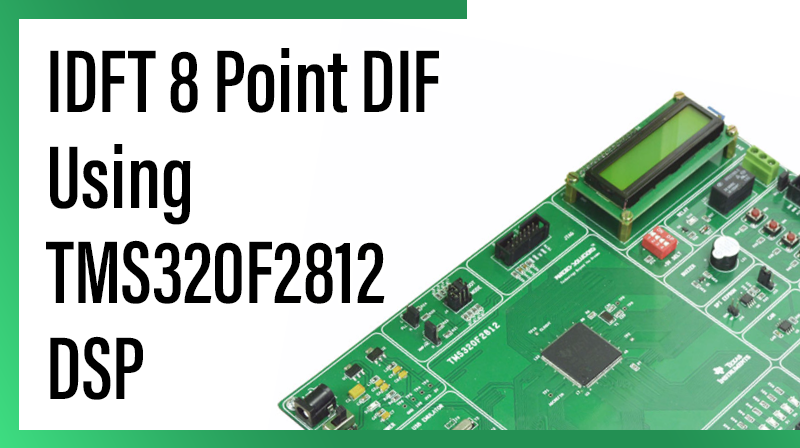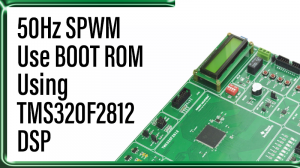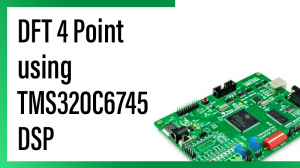
IDFT 8 Point DIF Using TMS320F2812 DSP
Aim
To perform the 8 point IDFT using DIF process from a given discrete sequence in TMS320F2812 KIT.
Requirements
☞CCS v3.3
☞USB Cable
☞5V Adapter
Theory
The algorithm for ifft(X) is the same as the algorithm for fft(X), except for a sign change and a scale factor of n = length(X). As for fft, the execution time for ifft depends on the length of the transform. It is fastest for powers of two. It is almost as fast for lengths that have only small prime factors. It is typically several times slower for lengths that are prime or which have large prime factors.
FFT algorithms can be used to compute an inverse DFT without any change in algorithm. The inverse DFT of an N-point sequence X(k) , k = 0,1, 2, . . . . ., N-1 is defined as
Procedure for build a project on IDFT 8 Point DIF Using TMS320F2812 DSP
Note: Once you install the Code Composer Studio v 3.3 software, the two icons will display in desktop
☞Setup Code Composer Studio v3.3
☞Code Composer Studio
1. Open Setup Code Composer Studio v3.3.
2. In System Configuration, select the board then → Remove all → yes.
☞In family, select C28xx.
☞In platform, select xds100 usb emulator.
☞In Endianness, select little.
☞Select F2812 XDS100 USB Emulator → add → save → quit → no.
Note: The above two steps only for first time to setup the processor in CCS.
3. Open Code Composer Studio v3.3.
4. Project → New.
☞ Project name : type the project name.
☞ Location : Browse, select the project location .
☞ Project Type : Executable(.out)
☞ Target : TMS320C28XX. → Finish.
5. File → New → Source file.
☞Type the program in untitled window.
6. File → Save.
☞Browse our project location then type our project name.c ( .c extension is must) →save.
7. Paste the following two cmd files in our project folder.
☞F2812_EzDSP_RAM_lnk.cmd
☞DSP281x_Headers_nonBIOS.cmd
☞DSP281x_GlobalVariableDefs.c
8. Project → Add files to project.
☞ In file of type : All files
☞Ctrl + Select the following files – projectname.c – DSP281x_GlobalVariableDefs.c – F2812_EzDSP_RAM_lnk.cmd – DSP281x_Headers_nonBIOS.cmd → open.
9. Project → Build Option.
In compiler tab, select Preprocessor
☞Include search path(-i) : C:\tidcs\c28\DSP281x\v120\DSP281x_headers\include
In linker tab, select libraries
☞Search path(-i) : C:\CCStudio_v3.3\C2000\cgtools\lib
☞ Incl libraries(-l) : rts2800_ml.lib.
In linker tab, select Basic
☞Stack Size(-stack): 0x400 → ok.
10. Project → Build (or) Rebuild all.
11. Connections for TMS320F2812 KIT
☞Connect 5v adpter to TMS320F2812 KIT.
☞Connect usb cable toTMS320F2812 KIT from pc.
☞Power on the TMS320F2812 KIT.
12. Debug → connect.
13. File → Load Program → Browse and select the projectname.out file → open
14. Debug → Go main.
15. View → Watch window → watch1.
☞Type the following array variable. – Xr( sequence output)
16. Debug → Run.
17. Debug → Halt
18. See the output at following location, View &rarr memory
Enter An Address : 0x3F9200 → Enter.
Type the input
For example
☞0x3F9200 – 0x0008
☞0x3F9201 – 0x0007
☞0x3F9202 – 0x0008
☞0x3F9203 – 0x0007
☞0x3F9204 – 0x0000
☞0x3F9205 – 0x0000
☞0x3F9206 – 0x0000
☞0x3F9207 – 0x0000
19. Or see the ouput at watch window.
Note: watch window will show exact decimal values, processor memory location will show a hexadecimal values.
Program for IDFT 8 Point DIF Using TMS320F2812 DSP
#include "DSP281x_Device.h"
#include
void InitSystem();
float tr[8],ti[8],s1r[8],s1i[8],s2r[8],s2i[8],Xr[8],Xi[8],Yr[8],Yi[8],tempr[8],tempi[8];
const float xr[8] = {4, 1, 0, 1, 0, 1, 0, 1 }; // real part input
const float xi[8] = {0, 2.414, 0, 0.414, 0, -0.414, 0, -2.414 }; // imaginary part input
const float W0r = 1,
W0i = 0,
W1r = 0.707,
W1i = -0.707,
W2r = 0,
W2i = -1,
W3r = -0.707,
W3i = -0.707;
void main()
{
int *Seq_out;
int i=0;
Seq_out = (int *)0x003F9200;
InitSystem();
// stage one process
s1r[0] = (xr[0] + xr[4]);
s1i[0] = (xi[0] + xi[4]);
s1r[1] = (xr[1] + xr[5]);
s1i[1] = (xi[1] + xi[5]);
s1r[2] = (xr[2] + xr[6]);
s1i[2] = (xi[2] + xi[6]);
s1r[3] = (xr[3] + xr[7]);
s1i[3] = (xi[3] + xi[7]);
s1r[4] = (xr[0] - xr[4]);
s1i[4] = (xi[0] - xi[4]);
tempr[0] = (xr[1] - xr[5]);
tempi[0] = (xi[1] - xi[5]);
s1r[5] = ((tempr[0] * W1r) - (tempi[0] * W1i));
s1i[5] = ((tempr[0] * W1i) + (tempi[0] * W1r));
tempr[1] = (xr[2] - xr[6]);
tempi[1] = (xi[2] - xi[6]);
s1r[6] = ((tempr[1] * W2r) - (tempi[1] * W2i));
s1i[6] = ((tempr[1] * W2i) + (tempi[1] * W2r));
tempr[2] = (xr[3] - xr[7]);
tempi[2] = (xi[3] - xi[7]);
s1r[7] = ((tempr[2] * W3r) - (tempi[2] * W3i));
s1i[7] = ((tempr[2] * W3i) + (tempi[2] * W3r));
// stage two process
s2r[0] = (s1r[0] + s1r[2]);
s2i[0] = (s1i[0] + s1i[2]);
s2r[1] = (s1r[1] + s1r[3]);
s2i[1] = (s1i[1] + s1i[3]);
s2r[2] = (s1r[0] - s1r[2]);
s2i[2] = (s1i[0] - s1i[2]);
tempr[3] = (s1r[1] - s1r[3]);
tempi[3] = (s1i[1] - s1i[3]);
s2r[3] = ((tempr[3] * W2r) - (tempi[3] * W2i));
s2i[3] = ((tempr[3] * W2i) + (tempi[3] * W2r));
s2r[4] = (s1r[4] + s1r[6]);
s2i[4] = (s1i[4] + s1i[6]);
s2r[5] = (s1r[5] + s1r[7]);
s2i[5] = (s1i[5] + s1i[7]);
s2r[6] = (s1r[4] - s1r[6]);
s2i[6] = (s1i[4] - s1i[6]);
tempr[4] = s1r[5] - s1r[7];
tempi[4] = s1i[5] - s1i[7];
s2r[7] = ((tempr[4] * W2r) - (tempi[4] * W2i));
s2i[7] = ((tempr[4] * W2i) + (tempi[4] * W2r));
// output
Xr[0] = (s2r[0] + s2r[1]);
Xi[0] = (s2i[0] + s2i[1]);
Xr[1] = (s2r[0] - s2r[1]);
Xi[1] = (s2i[0] - s2i[1]);
Xr[2] = (s2r[2] + s2r[3]);
Xi[2] = (s2i[2] + s2i[3]);
Xr[3] = (s2r[2] - s2r[3]);
Xi[3] = (s2i[2] - s2i[3]);
Xr[4] = (s2r[4] + s2r[5]);
Xi[4] = (s2i[4] + s2i[5]);
Xr[5] = (s2r[4] - s2r[5]);
Xi[5] = (s2i[4] - s2i[5]);
Xr[6] = (s2r[6] + s2r[7]);
Xi[6] = (s2i[6] + s2i[7]);
Xr[7] = (s2r[6] - s2r[7]);
Xi[7] = (s2i[6] - s2i[7]);
// bit reversal
tr[0] = Xr[0];
ti[0] = Xi[0];
tr[1] = Xr[4];
ti[1] = Xi[4];
tr[2] = Xr[2];
ti[2] = Xi[2];
tr[3] = Xr[6];
ti[3] = Xi[6];
tr[4] = Xr[1];
ti[4] = Xi[1];
tr[5] = Xr[5];
ti[5] = Xi[5];
tr[6] = Xr[3];
ti[6] = Xi[3];
tr[7] = Xr[7];
ti[7] = Xi[7];
// sending output array to memory location
for(i=0;i<8;i++)
{
*Seq_out ++= tr[i];
}
for(;;);
}
void InitSystem()
{
EALLOW;
SysCtrlRegs.WDCR= 0x0068; // Setup the watchdog
// 0x0068 to disable the Watchdog , Prescaler = 1
// 0x00AF to NOT disable the Watchdog, Prescaler = 64
SysCtrlRegs.SCSR = 0; // Watchdog generates a RESET
SysCtrlRegs.PLLCR.bit.DIV = 10; // Setup the Clock PLL to multiply by 5
SysCtrlRegs.HISPCP.all = 0x1; // Setup Highspeed Clock Prescaler to divide by 2
SysCtrlRegs.LOSPCP.all = 0x2; // Setup Lowspeed CLock Prescaler to divide by 4
// Peripheral clock enables set for the selected peripherals.
SysCtrlRegs.PCLKCR.bit.EVAENCLK=0;
SysCtrlRegs.PCLKCR.bit.EVBENCLK=0;
SysCtrlRegs.PCLKCR.bit.SCIAENCLK=0;
SysCtrlRegs.PCLKCR.bit.SCIBENCLK=0;
SysCtrlRegs.PCLKCR.bit.MCBSPENCLK=0;
SysCtrlRegs.PCLKCR.bit.SPIENCLK=0;
SysCtrlRegs.PCLKCR.bit.ECANENCLK=0;
SysCtrlRegs.PCLKCR.bit.ADCENCLK=0;
EDIS;
}
Result
Thus, the 8 point IDFT of given sequence has performed and the result is stored at memory location(0x3F9200).



